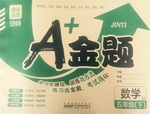题目内容
B. such
C. too
D. enough

 A加金题 系列答案
A加金题 系列答案 全优测试卷系列答案
全优测试卷系列答案In the decade(十年)of the 1970s, the United Nations organized several important meetings on the human environment to study a very serious problem.We humans are destroying the world around us.We must learn to protect them, or life will be very bad for our children and grandchildren.
There are several major aspects to this problem.
Population
Most problems of the environment come from population growth.In 1700 there were 635 million people in the world; in 1900 there were 1.6 billion; in 1950, 2.5 billion; and in 1980, 4.4 billion.In the year 2010 there will be 7.3 billion.More people need more water, more food, more wood, and more petroleum.
Distribution
Scientists say there is enough water in the world for everyone, but some countries have a lot of water and some have only a little.Some areas get all rain during one season.The rest of the year is dry.
Petroleum
We are using up the world’s petroleum.We use it in our cars and to heat our buildings in winter.Farmers use petrochemicals to make the soil rich.They use them to kill insects on those plants.These chemicals go into rivers and lakes and kill the fish there.Thousands of people also die from these chemicals every year.Chemicals also go into the air and pollute it.Winds carry this polluted air to other countries and other countries.
Poverty
Poor farmers use the same land over and over.The land needs a rest so it will be better next year.However, the farmer must have food every year.Poor people cut down trees for firewood.In some areas when the trees are gone, the land becomes desert.However, people need wood to cook their food now.Poor people cannot save the environment for the future.
We now have the information and the ability to solve these huge problems.However, this is not a problem for one country or one area of the world.It is a problem for all humans.The people and the nation of the world must work together to protect the world’s resources.No one controls the future, but we all help make it.
【小题1】According to the passage, our world is being destroyed mainly because ______.
| A.pollution is getting worse and worse |
| B.population are increasing greatly |
| C.we humans are using up all of our natural resources |
| D.distribution is not reasonable. |
| A.having things in the right place at the right time. |
| B.cutting down forests and selling them to other countries. |
| C.building water systems to carry water to farms. |
| D.conserving our natural resources |
| A.The World Being Destroyed |
| B.A Serious Problem We Should Pay Attention to |
| C.Aspects That Destroyed Our World |
| D.Conserving the World’s Natural Resources |